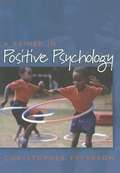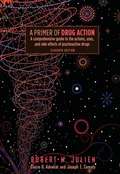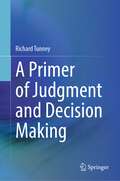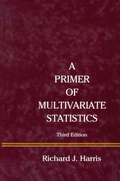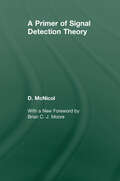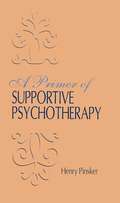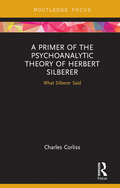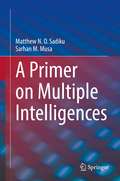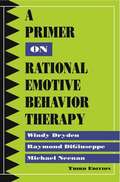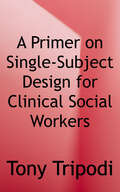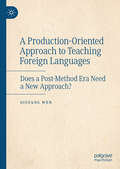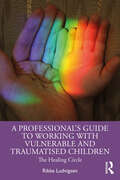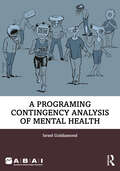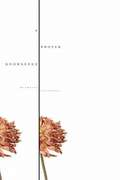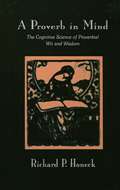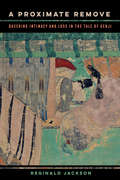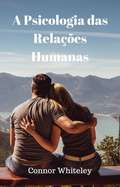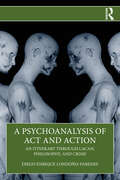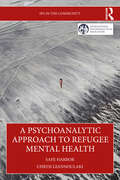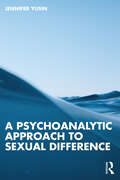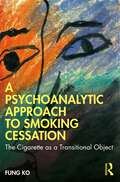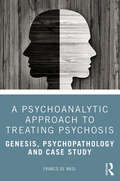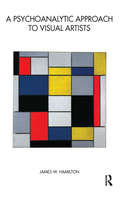- Table View
- List View
A Primer in Positive Psychology
by Christopher PetersonPositive psychology is a new approach that is based upon the scientific study of what goes right in life. Suitable for a one-semester college course, this introductory text covers all of the main topics of concern to the field. These include (for example) happiness, character strengths, values, wellness, and positive interpersonal relationships. Peterson teaches psychology at the U. of Michigan. Annotation ©2006 Book News, Inc., Portland, OR (booknews.com)
A Primer of Drug Action: A Comprehensive Guide to the Actions, Uses, and Side Effects of Psychoactive Drugs (11th edition)
by Robert M. JulienA definitive guide to the pharmacology of drugs that affect the mind and behavior with over 40% new research citations. A clearer and current presentation on the mechanisms of drug action, etiologies of major psychological disorders, rationales for drug treatment, and the uses of psychopharmacology in patient care.
A Primer of Judgment and Decision Making
by Richard TunneyThe book is intended as a primer and discusses the main areas within judgment and decision making. However, these topics are not siloed. Instead, a narrative arc throughout the book has a higher level of critical appraisal of the key concepts and how they relate to some of the big questions about the nature of human rationality. The book begins by introducing two perspectives on rationality. The first describes how we decide on the goodness of a decision. This is a surprisingly recent concept called Rational Choice Theory, which was formed from a collection of books written around the time of the Second World War, that deal with how we think about risk as a probability and goodness as utility. In short, Rational Choice Theory argues that to be rational, people should always make the decision that maximizes subjective expected utility. The book goes on to describe the consensus view that emerged in the late 1960s and came to dominate our thinking about decision making, namely that people rarely make rational decisions. In fact, many Nobel prizes have been handed out for work showing that humans are not rational creatures (e.g. Daniel Kahneman, Richard Thaler, Robert Shiller). The book concludes with recent theoretical developments in our understanding of how people make decisions that reconcile Rational Choice Theory with human irrationality. Although aimed primarily at second year undergraduates studying judgement and decision making as a core component of cognitive psychology, the book will also be relevant to third year electives in and MSc programmes. The book will also interest undergraduates studying economics, and undergraduates studying more general degrees in liberal arts or natural science. As an introductory text the book assumes no prior knowledge of judgement and decision making, cognitive psychology or economics. However, the level of the book assumes that the reader is familiar with academic texts and has experience of critical thinking. A key requirement of the reader is a willingness to relate academic concepts to the real world, and to try and understand the bigger picture about human psychology and its place in society.
A Primer of Multivariate Statistics
by Richard J. HarrisDrawing upon more than 30 years of experience in working with statistics, Dr. Richard J. Harris has updated A Primer of Multivariate Statistics to provide a model of balance between how-to and why. This classic text covers multivariate techniques with a taste of latent variable approaches. Throughout the book there is a focus on the importance of describing and testing one's interpretations of the emergent variables that are produced by multivariate analysis. This edition retains its conversational writing style while focusing on classical techniques. The book gives the reader a feel for why one should consider diving into more detailed treatments of computer-modeling and latent-variable techniques, such as non-recursive path analysis, confirmatory factor analysis, and hierarchical linear modeling. Throughout the book there is a focus on the importance of describing and testing one's interpretations of the emergent variables that are produced by multivariate analysis.
A Primer of Signal Detection Theory
by Don McNicolA Primer of Signal Detection Theory is being reprinted to fill the gap in literature on Signal Detection Theory--a theory that is still important in psychology, hearing, vision, audiology, and related subjects. This book is intended to present the methods of Signal Detection Theory to a person with a basic mathematical background. It assumes knowledge only of elementary algebra and elementary statistics. Symbols and terminology are kept at a basic level so that the eventual and hoped for transfer to a more advanced text will be accomplished as easily as possible. Intended for undergraduate students at an introductory level, the book is divided into two sections. The first part introduces the basic ideas of detection theory and its fundamental measures. Its aim is to enable the reader to be able to understand and compute these measures. It concludes with a detailed analysis of a typical experiment and a discussion of some of the problems which can arise for the potential user of detection theory. The second section considers three more advanced topics: threshold theory, the extension of detection theory, and an examination of Thurstonian scaling procedures.
A Primer of Supportive Psychotherapy
by Henry PinskerFor many patients, supportive therapy is the treatment of choice, and for many others, the use of medications or of more expressive techniques optimally occurs in the context of a supportive relationship. Yet, there is a paucity of literature expressly devoted to the techniques and aims of supportive psychotherapy. In A Primer of Supportive Psychotherapy, Henry Pinsker remedies this situation by focusing directly on the rationale for, and techniques of, supportive psychotherapy. He explores this modality as a form of dyadic intervention quite distinct from expressive psychotherapies, and also shows how, to varying extents, supportive psychotherapy makes use of patterns of relationships and behavior, past and present. Pinsker's writing is wise, human, and direct. The realities, ironies, conundrums, and opportunities of the therapeutic encounter are vividly portrayed in scores of illustrative dialogues drawn from actual treatments. Destined to become the classic introductory work in the field, A Primer of Supportive Psychotherapy will be valued by students and trainees in all mental health disciplines--and by their teachers--for its wealth of practical guidelines and explicit instruction on how to develop, maintain, and make optimal therapeutic use of a supportive relationship. Psychopharmacologists, counselors, nurse practitioners, and primary care physicians are among the helping professionals who will likewise benefit from Pinsker's clear presentation of the principles of supportive work. Beyond its didactic value, this text will be an indispensable conceptual touchstone for any clinician interested in understanding more clearly the differences among various interventional modalities as a preliminary step in optimal treatment planning.
A Primer of the Psychoanalytic Theory of Herbert Silberer: What Silberer Said (Routledge Focus on Analytical Psychology)
by Charles CorlissHerbert Silberer was an early member of Freud’s Vienna Group whose work was unique and prodigious; yet, owing to his expulsion from the psychoanalytic community, his contributions have been dismissed for close to a century. Based on original documents and primary sources, A Primer of the Psychoanalytic Theory of Herbert Silberer: What Silberer Said recovers the psychoanalytic theory of Herbert Silberer, revealing its connections to philosophy, theology and transcendence, and examining how his writings influenced C. G. Jung. The book begins with an overview of what is known of Silberer’s life, before commencing with an exploration of his writings. Charles Corliss covers topics including Silberer’s groundbreaking construct of the hypnagogic phenomenon, the process and meaning of symbolism and symbol formation, alchemy and its connection to his major work Problems of Mysticism and Symbolism, the use of symbols in Freemasonry and his influential understanding of dreams and their meaning. The book also explores Silberer’s complex relationship with the field of psychoanalysis, including his opposition to many psychoanalytic assumptions. Introducing and assessing the main contributions of Silberer’s work, this book will be of interest to analytical psychologists and Jungian psychotherapists in practice and training, as well as to academics and students of Jungian studies and the history of psychoanalysis, psychoanalytic studies, theology, philosophy and the history of psychology.
A Primer on Multiple Intelligences
by Sarhan M. Musa Matthew N. SadikuThis book provides an introduction to nineteen popular multiple intelligences. Part One discusses general intelligence, psychological testing, naturalistic intelligence, social intelligence, emotional intelligence, interpersonal intelligence, and cultural intelligence. Part Two tackles machine intelligence, the development of artificial intelligence, computational intelligence, and digital intelligence, or the ability for humans to adapt to a digital environment. Finally, Part Three discusses the role of intelligence in business development, using technology to augment intelligence, abstract thinking, swarm and animal intelligence, military intelligence, and musical intelligence. A Primer on Multiple Intelligences is a must-read for graduate students or scholars considering researching cognition, perception, motivation, and artificial intelligence. It will also be of use to those in social psychology, computer science, and pedagogy. It is as a valuable resource for anyone interested in learning more about the multifaceted study of intelligence.
A Primer on Rational Emotive Behavior Therapy
by Windy Dryden Michael Neenan Raymond DigiuseppeThis new edition provides a concise but systematic guide to the basics of REBT--a valuable approach for helping clients overcome emotional and behavioral difficulties. The authors have updated this practical resource to reflect recent developments in REBT theory and practice. Part I briefly outlines the principles considered central to an understanding of REBT. Part II details a sequence of twenty REBT steps recommended for use during peer counseling and clinical work. Part III illustrates the application of the REBT process to a specific case. The brief overview of REBT practice presented in this primer is designed to complement rather than replace comprehensive texts for conducting REBT at a more advanced level.
A Primer on Single-Subject Design for Clinical Social Workers
by Tony TripodiThe move to managed care in the human services has increased the popularity of single-subject design -- an adaptable methodology that is information based, outcome oriented, and consumer driven. <p><p>Special Features: Contains 39 tables and 55 figures; Demonstrates how clinicians can use the model to monitor treatment effectiveness; Promotes accountability in clinical practice.
A Production-Oriented Approach to Teaching Foreign Languages: Does a Post-Method Era Need a New Approach?
by Qiufang WenThis book introduces and explains the production-oriented approach (POA) to teaching foreign languages, a new approach developed by the author through 15 years of rigorous experimentation. Addressing the common challenge of separating input from output in language learning, the book details POA procedures in three phases: motivating, enabling, and assessing. It explores the theoretical underpinnings of the POA, including sociocultural, usage-based linguistic, second language acquisition, and curriculum theories. The author presents a series of case studies showcasing the POA in practice. She also provides a comparative analysis with the task-based approach and project-based learning, highlighting similarities and differences between the two. This book will be essential reading for teachers and scholars in applied linguistics, modern foreign languages, language acquisition, and language education, offering valuable insights and practical guidance for enhancing language teaching effectiveness.
A Professional's Guide to Working with Vulnerable and Traumatised Children: The Healing Circle
by Rikke LudvigsenThis book presents “The Circle of Safety and Reconnection”, a compassionate reflection model for working with vulnerable and traumatised children and young people in a nurturing way, providing hope for post-traumatic healing and growth.The circle is a holistic and comprehensive framework for professionals working to create safety for children against violence and abuse. It takes into consideration a child’s individual, intergenerational, and collective trauma also assessing their risk and protection factors and using different tools to regulate the nervous system and promote healing. A step-by-step guide, populated with practice examples and exercises to walk the reader through using and adapting the model in practice, the book discusses the nature, signs, and ways of trauma, the reasons for it, and the different ways of healing these wounds outside the therapeutic context. Additionally, as this field is high risk for secondary traumatisation, stress, burnout, and compassion fatigue, the author has dedicated a chapter focusing solely on the building of resilience in professionals.This text is written for all professionals working in the field, including therapists and psychologists, social workers, educators, foster parents, nurses, day-care workers, and students.
A Programing Contingency Analysis of Mental Health (Behavior Science)
by Israel GoldiamondA Programing Contingency Analysis of Mental Health presents Dr. Israel Goldiamond’s reflections on various ways we formulate behavioral and emotional problems, most often in traditional terms of mental health disorders, mental diseases or illnesses, psychopathological disorders, and so on – what he calls a pathological orientation. Here, Goldiamond argues for a groundbreaking alternative view from the vantage point of radical behaviorism. The book begins by discussing contingency relations between behavior and its past and present consequences, along with other environmental events. It reminds us that this approach sits comfortably alongside other consequential systems in the social and biological sciences, particularly decision theory and evolution. This behaviorist system regards most important human behaviors as being emitted rather than stimulus-elicited. Described are some of the diverse origins of behavior, including the effects of environmental consequences and the programing procedures of social and cultural inheritance. The exposition includes decision matrices which rationalize some of the programed patterns and the accompanying thoughts and emotions commonly found in mental illness. As a result of this nonlinear contingency analysis, such patterns may be considered adaptive rather than maladaptive. The book describes programs based on those matrices and outlines how they might be applied to mitigate any problems or costs associated with those patterns. The book concludes by moving from individual analysis to social analysis, with particular reference to some societal contingencies that may maintain the pathological orientation and others that might shift our gaze in the direction proposed here. Alongside Dr. Goldiamond’s original work, this volume features a new introduction from Dr. Paul Thomas Andronis and Dr. T. V. Joe Layng, as well as an article tracing the history of the non-linear thinking of Dr. Goldiamond, first published in The Behavior Analyst. It will be a must-read for anyone working in the analysis of and clinical intervention in problems associated with mental health, or those more generally interested in the work of Israel Goldiamond.
A Proper Knowledge
by Michelle Latiolais"Every passionate reader lives for that first page of a book that alerts her, straightaway, she'll be sorry when the book ends. So it is with Michelle Latiolais' astonishing, sparklingly intelligent new novel...The work strives, with bold zest, to arrive at the marrow of things...Latiolais triumphs, folding the work's clinical ruminations into the story's delicious batter. Powerfully recommended."--Antioch Review "The novel counts--in elegant and sometimes elegiac prose--the shadowy and elusive opportunities for redemption."--Ron Carlson, author of Five Skies "A ravishing intelligence is at work in these pages."--Elizabeth Tallent, author of Honey, on Even Now A gifted psychiatrist, haunted by the death of his young sister, seeks to penetrate the mysteries of childhood autism in this beautifully written, insightful investigation into the misunderstood pathways of the brain--and the heart.
A Proverb in Mind: The Cognitive Science of Proverbial Wit and Wisdom
by Richard P. HoneckSEE SHORT BLURB FOR ALTERNATE COPY... A complex, intriguing, and important verbal entity, the proverb has been the subject of a vast number of opinions, studies, and analyses. To accommodate the assorted possible audiences, this volume outlines seven views of the proverb -- personal, formal, religious, literary, practical, cultural, and cognitive. Because the author's goal is to provide a scientific understanding of proverb comprehension and production, he draws largely on scholarship stemming from the formal, cultural, and cognitive views. The only book about proverbs that is written from the standpoint of cognitive science, cognitive psychology, and experimentalism, this text provides a larger, more interdisciplinary perspective on the proverb. It also gives a theoretically more integrated approach to proverb cognition. The conceptual base theory of proverb comprehension is extended via the "cognitive ideals hypothesis" so that the theory now addresses issues regarding the creation, production, and pragmatics of proverbs. This hypothesis also has strong implications for a taxonomy of proverbs, proverb comprehension, universal vs. culture-specific aspects of proverbs, and some structural aspects of proverbs. In general, the book extends the challenge of proverb cognition by using much of what cognitive science has to offer. In so doing, the proverb is compared to other forms of figurative language, which is then discussed within the larger rubric of intelligence and the inclination for using indirect modes of communication. Child developmental and brain substrates are also discussed.
A Proximate Remove: Queering Intimacy and Loss in The Tale of Genji (New Interventions in Japanese Studies #2)
by Reginald JacksonA free ebook version of this title is available through Luminos, University of California Press's Open Access publishing program. Visit www.luminosoa.org to learn more. How might queer theory transform our interpretations of medieval Japanese literature and how might this literature reorient the assumptions, priorities, and critical practices of queer theory? Through a close reading of The Tale of Genji, an eleventh-century text that depicts the lifestyles of aristocrats during the Heian period, A Proximate Remove explores this question by mapping the destabilizing aesthetic, affective, and phenomenological dimensions of experiencing intimacy and loss. The spatiotemporal fissures Reginald Jackson calls "proximate removes" suspend belief in prevailing structures. Beyond issues of sexuality, Genji queers in its reluctance to romanticize or reproduce a flawed social order. An understanding of this hesitation enhances how we engage with premodern texts and how we question contemporary disciplinary stances.
A Psicologia das Relações Humanas: Uma Série Introdutória
by Connor WhiteleyDas diferentes razões para atrair comportamentos pró-sociais, desvendamos as relações humanas. A evolução desempenha um papel na escolha do parceiro? Promover um bom comportamento social é eficaz? Qual é o Efeito Espectador? Essas são apenas algumas das questões interessantes e importantes que exploraremos neste livro, à medida que exploramos a psicologia das relações humanas. Então, junte-se a mim, pois juntos exploraremos o mundo fascinante da psicologia das relações humanas neste livro com um conversa intrigante que claramente dissolve e avalia criticamente conceitos e teorias para que todos possam desfrutar as maravilhas da psicologia ... e não sentir dor de cabeça no final!
A Psychiatrist Works with Blindness
by Louis S. CholdenEach patient will react to blindness in a manner characteristic for his personality. He will react to it as an emergency situation which will have most serious consequences for his future life plans. Besides the emergency aspect of the loss of vision, blindness in itself holds a number of special and deep meanings to the patient which must be considered in attempting to understand its effects. These meanings may be discussed from the psychologic, social and vocational points of view. But, because the patient will react to the problem of blindness in a way which is peculiar to him, one might predict within certain limits what the patient's reactions will be, providing we understand his personality structure.
A Psychoanalysis of Act and Action: An Itinerary through Lacan, Philosophy, and Crime
by Diego Enrique Londoño-ParedesA Psychoanalysis of Act and Action brings together the study of the philosophy of action and Jacques Lacan’s psychoanalytic theory.Drawing on the works of Freud and Lacan, this book examines desire and the unconscious as key frameworks for understanding action. Londoño-Paredes explores key premises in the philosophy of action, while demonstrating how these may fall short in light of Lacan’s ideas. The book proposes an alternative to dominant philosophical interpretations, exploring Lacan’s framework through concepts such as the graph, the act, the transgressive act, acting out, and passage à l’acte. The paradoxes of action, along with forms of action that carry moral and symbolic weight are examined from a psychoanalytic perspective, helping us to understand the interpretive boundaries of action. By intertwining philosophical and psychoanalytic perspectives with clinical illustrations of real crimes, the book offers a fresh approach to action and act.A Psychoanalysis of Act and Action will be essential for psychoanalytically informed readers interested in Lacan. It will also be of interest to academics and scholars of the philosophy of mind and action, cultural studies, criminology, and mental disorders.
A Psychoanalytic Approach to Refugee Mental Health: Safe Harbor (IPA in the Community)
by Chrysi GiannoulakiA Psychoanalytic Approach to Refugee Mental Health reflects on psychoanalytic work with vulnerable people during the refugee crisis.Chrysi Giannoulaki describes her work as a supervisor of groups of caregivers dealing with the mental health of refugees and occasionally as a psychiatrist of refugees in Moria, Lesvos, and in Athens. The book explores work with complex refugee cases that involve major economic, political, and social issues, with victims of sexual violence, and with unaccompanied minors. Exploring the potential of psychoanalytic theory of trauma and psychosis, clinical psychoanalytic thinking to foster integration, and tolerance of the extremely traumatized individual within networks of social relations, the book acts protectively against moments of xenophobia and polarization.A Psychoanalytic Approach to Refugee Mental Health will be essential reading for psychoanalytically informed mental health professionals, especially those working with refugees, asylum seekers, and vulnerable patients.
A Psychoanalytic Approach to Sexual Difference
by Jennifer YusinA Psychoanalytic Approach to Sexual Difference analyzes the concepts of sex and gender, showing how sexual difference is characterized by ongoing transformations of spatiality and body, and of essentiality and normativity. In this book, Jennifer Yusin presents a psychoanalytic study that engages with clinical cases, philosophies of sex and gender, and psychoanalytic writings about sexual difference. She deftly and accessibly analyzes Freud’s and Lacan’s work on feminine sexuality, Winnicott’s notion of the transitional object, and theories of sexuality and gender developed by Judith Butler and Monique Wittig, among others. Yusin starts with the question of how the lack of any essential definition of sexual difference affects subjectivity. She places an emphasis on the psychoanalytic experience and its effects upon how a subject experiences the difference between being a body and having a body. Following Lacan’s discovery of the Borromean knot structure of the unconscious and the work of the psychoanalyst Jean-Gérard Bursztein, Yusin continues developing subjective topology as a methodology. She also introduces and shows how sexual difference is linked to transformations of sex and body. Through this, Yusin highlights how it is necessary to reformulate sex, gender, and sexual identities in psychoanalytic theories and in the practice of psychoanalysis. She also speaks to the necessity of generating a new lexicon to help analysts speak about sexual difference in ways that do not perpetuate any essentialism or normativity on the topic. This book is essential reading for clinicians in psychoanalysis, mental health practitioners in the trans field, and academics working in gender theory, queer and trans studies, and feminist philosophies.
A Psychoanalytic Approach to Sexual Difference
by Jennifer Yusin1. This book presents an original analysis of sexual difference, emphasising the psychoanalytic experience and its effects upon how a subject experiences the difference between being a body and having a body; 2. Yusin elucidates this potentially muddied (?) area with an approachable writing style, highlighting the tools contemporary analysts need to advance their own notions of sex and gender, as well as how to update their lexicon and approach to the topic; 3. Throughout, Yusin draws on the psychoanalytic theories of Freud, Lacan and Winnicott, as well as theories of sexuality and gender developed by Michel Foucault, Judith Butler and Jack Halberstam;
A Psychoanalytic Approach to Smoking Cessation: The Cigarette as a Transitional Object
by Fung KoA Psychoanalytic Approach to Smoking Cessation: The Cigarette as a Transitional Object provides an accessible understanding to the unconscious motive behind smoking addiction using Winnicott’s concept of the transitional object. The book is divided thematically into six parts. Ko begins by outlining the conscious motives for smoking from a psychological perspective and looks at commercial research conducted by the tobacco industry, before using psychoanalytically informed cross-disciplinary literature to assess the unconscious motives for smoking. She expertly introduces Winnicott’s view on smoking addiction, using his concept of the transitional object, and highlights the power of the Free Association Narrative Interview method in accessing the unconscious and embedded emotional experiences. Using clinical examples, she illustrates the benefits of this method as a tool to elicit free associations from research respondents. She details the parallels between the individual respondents’ smoking experience, as well as their relationship with cigarettes and the seven qualities of transitional objects outlined by Winnicott in his 1953 landmark paper. Ko concludes by emphasising the significance and implications of this thesis to smokers and public health policy, as well as the smoking cessation approach and proposed directions for future research. This book is an essential resource for psychoanalysts and psychotherapists working in smoking cessation organisations, as well as those working in addiction services.
A Psychoanalytic Approach to Treating Psychosis: Genesis, Psychopathology and Case Study
by Franco de MasiA Psychoanalytic Approach to Treating Psychosis shows how, by understanding the antecedents and dynamics of psychosis, a psychoanalytic approach can offer a long-term alternative to the only psychotropic therapy and an explanation of the infantile origin of the illness. This ground-breaking examination begins by clearly explaining complex terms and theories from the most significant thinkers in psychoanalysis. Split into three parts, it then explores the problems faced when following one specific technique for understanding the psychotic process. Practical as well as theoretical, Part 2 illustrates how to prepare an appropriate setting for the patient, including the importance of listening and the analyst’s approach, as well as highlighting key features of the condition, such as delusions, hallucinations, infantile withdrawal and psychotic dreams. Acknowledging that psychosis is a psychic transformation which the mind works as a sensorial organ, the author asserts that the seeds are sown in childhood through emotional trauma, leading to withdrawal into a fantasy world. Brimming with real-life vignettes throughout, Part 3 is dedicated to a unique and lengthy case study to illustrate the challenges of working with such patients. It also looks positively towards future research on psychosis informed by insights from neuroscience. Innovative and accessible, this book will be essential reading for anyone working in psychosis, including psychoanalysts, psychiatrists, psychologists and physicians.
A Psychoanalytic Approach to Visual Artists
by James W. HamiltonJames Hamilton's engaging book offers us his own unique insight into the unconscious factors involved in the creative processes associated with painting, filmmaking, and photography by studying the lives and works of a number of artists, each one having a unique personal style. In separate chapters, he looks at the lives and works of Mark Rothko, Joseph Cornell, Piet Mondrian, Pablo Picasso, Clement Greenberg, Edward Weston, Ingmar Bergman, Francois Truffaut, Quentin Tarantino, and Florian von Donnersmarck from a psychoanalytic perspective with emphasis on unconscious motivation and the quest for mastery of intrapsychic conflict. The book is bound to encourage further questions and hypotheses about the nature of these complex phenomena.
